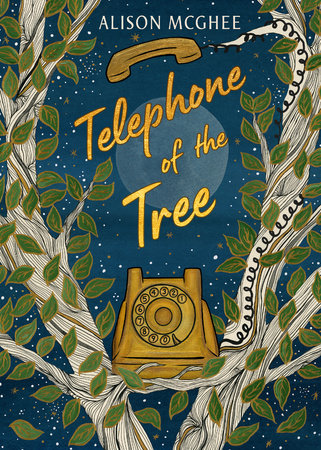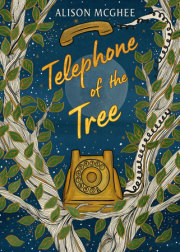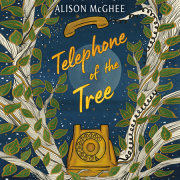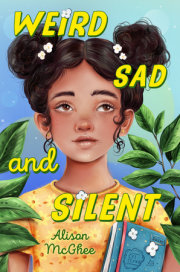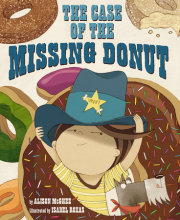How I picture the night Kiri and I first met each other, first looked into each other’s eyes, first reached for each other’s hand, back when we were babies:
The moon like a bright white ship sailing through the sky.
Tree limbs dark against the moonlight, branches reaching to the invisible sun.
Kiri’s mom holding Kiri tight in her arms and dancing Kiri down the block.
My dad holding me tight in his arms and dancing me down the block.
In the bright moonlight they dance their crying babies up and down the block so we’ll stop crying, so we’ll be peaceful, so we’ll . . .
sleepsleepsleeeeeeepI picture Kiri’s mom and my dad whispering the names of all the trees to Kiri and me as they dance us past:
oak maple willowbirch pine mulberrycrabapple ginkgo butternutand all those whispers weave their way into our hearts that night, so that night of dancing with the trees becomes the night that made
Kiri and me
love trees
maybe even
want to
be trees
because of their tall, strong calm
Almost all the trees on our block were planted to celebrate new babies—
oak for Pops
maple for Dad
mulberry for Mrs. S
weeping willows for Rowan and Geneva
little crabapple for Gentleman
baby birch for me
baby pine for Kiri
The oak and maple and mulberry trees are tall and wide now. They’ve been growing as long as Pops and Dad and Mrs. S have been alive.
But two of the trees were planted not for new babies, but in remembrance of people who passed on.
The ginkgo in honor of Mrs. S’s husband, Douglas, because he loved their beautiful fan-shaped leaves.
The butternut in honor of my grandmother Randa, because she loved to eat butternuts.
Fast-forward to second grade. Kiri and I are in Mr. Nesbitt’s class. He has just told us all to draw a
What Do You Want to Be? picture.
“Imagine yourselves at age thirty,” he says.
Thirty?
Kiri and I are seven. It takes a long time for us just to count to thirty. We look at each other.
“I mean, my
mom is thirty,” Kiri whispers.
“My parents are thirty-
one,” I whisper back.
Will we ever be that old? When we get to that age, will we
feel old?
Thirty is so, so far in the future.
But Kiri and I know what we want to be. We’ve always known, known from the night our parents danced us past the trees.
I look over at Kiri, who’s already drawing, sketching an outline on rough paper.
Tall brown trunk. Branches curving downward, filled with pine cones. A child with braids and a round face smiling out of the trunk itself.
“White pine!” I say.
Kiri nods and smiles. Their own white pine, planted in front of their house at the end of the block when Kiri was born, is already taller than they are.
My turn.
I pick up a tan crayon and a white crayon and a green crayon and begin to draw.
White trunks split at the base and curve upward. Papery branches float out and up. Green leaves dance on limbs.
“River birch!” Kiri says.
“Yup!”
Then:
“
TREES?” Martina says in her Martina voice. “Kids can’t be
TREES.”
Martina always, somehow, knows what to say to make others feel bad.
Right away my hand covers up the drawing. Right away Martina’s eyes flash and she smirks. She knows she’s gotten to me.
Martina always gets to me.
But not to Kiri.
“What’s your problem, Martina?”
Kiri is calm, and their voice is soft, and their question
sounds like a question but isn’t. What Kiri is really saying is
back off.
“Mr. Nesbitt told us to draw what we
want to be, right?” Kiri continues. “And Ayla and I want to be trees.”
Kiri has power.
Kiri has
presence.
Kiri is already like a tree.
“Ayla and I are dreaming big,” Kiri says to Martina. “Why shouldn’t we?”
Yeah, why shouldn’t we? I think, and we look at Martina until she frowns and backs away.
Kiri makes everything better.
That day in Mr. Nesbitt’s class is the day I learn you don’t have to make up an excuse for what you want to be.
You can just dream big.
Kiri and I are ten now. Second grade was a long time ago, but we still dream big.
I still think about that day, though. I see Martina’s face and the way she backed slowly away from our table, as if there were a force field around it.
I see Mr. Nesbitt’s head, bent over his desk. His dark hair fallen across his face, and his pencil scribbling
shhh-shhh-shhh across the same rough paper the rest of us used back then.
I wish Kiri were around right now. It’s easier to dream big when they’re with me.
Junie For Short must wish Kiri were here too. Junie For Short is Kiri’s dog, and sometimes these days she just howls and howls.
“Junie sure misses Kiri,” my mom says. “Just like the rest of us.”
“Her name is Junie For Short,” I say. “Don’t call her Junie.”
Junie For Short’s real name is Juniper, but that name was too big for the tiny puppy she used to be. So Kiri and I nicknamed her Junie, for short, only what stuck was the whole thing: Junie For Short.
I don’t howl, but
I miss Kiri too.
I picture Kiri, calm and strong, like a tree.
Kiri, come home.Just as I’m thinking that, Junie For Short, all the way down the block at Kiri’s house, begins to howl again, as if she can hear my thoughts.
“That dog’s always crying these days,” says a voice from the sidewalk.
“I bet she misses Kiri,” says a child’s voice, and at the sound of those voices I stay
still
still
still
in my birch tree, because I know the voices are Gentleman and his mother. Gentleman is a nickname too. His real name is Fraser, but no one calls him that except his parents, and only when they’re angry with him.
Which is a lot.
Not today, though.
Since Kiri left, I try to avoid Gentleman, but it’s kind of impossible because he lives on our block.
He keeps asking me about Kiri, like he’s worried or something, like he wants me to talk. Like he doesn’t like me being quiet.
He tells me to call Kiri.
“I can’t,” I tell him. “There’s no phone where Kiri is.”
“Text them, then.”
“Gentleman. You need a phone to text.”
“Well then, go visit!”
I just close my eyes and shake my head. There’s a lot that Gentleman doesn’t understand, about phones and a whole lot else. So as he and his mom pass by my tree, I shrink up against it, hoping he won’t see me.
It’s futile. Up he comes to me in my tree. Five years old and full of swagger. The top of his head, with its sproingy wild curls, bobs in my direction.
You can’t deny it, Gentleman’s a cute kid.
But he’s also a pain, with his constant chatter. His constant
But why are you so quiet these days and
Why don’t you just call Kiri.
“Go home, Gentleman,” I say.
“Your mom’s going to start yelling for you any second.”
Through the birch leaves I see his mom’s almost at their apartment building.
Hey! Come back and get your kid, I think.
But then I see that Gentleman doesn’t look like his usual self. His eyes aren’t bright, the way they usually are. He just looks at me.
Then: “Can I tell you something, Ayla?”
I shrug. It’s no use to say no. If Kiri were here, we’d give each other a secret
here he goes again look.
He looks at me with those un-bright, un-Gentleman eyes.
“Ayla,” he whispers. “Sweetheart died.”
“Oh no! Sweetheart, your gecko?”
He nods. Leans against a low limb of my birch tree. His mouth is pressed tight in a way that looks the way my own mouth suddenly feels, which is a
don’t cry sort of feeling.
Those eyes of his. So sad.
This is terrible.
The idea of Sweetheart being dead is too hard to handle. Gentleman loves that lizard as much as Kiri loves Junie For Short.
“How did Sweetheart die?” I ask.
“My mom says ‘How should I know, I’m not a vet,’” he says. “My dad says I probably fed her something bad for her.”
“Like what?”
“Like a Cheerio,” he whispers. “Sometimes. For a treat.”
It doesn’t seem as if a Cheerio once in a while would kill a gecko. And it seems like a mean thing to say to a little tiny kid who just lost their best lizard friend. But Gentleman’s parents aren’t like mine.
“Now I know why Junie For Short keeps howling,” he says. “It’s because she misses—”
Suddenly Gentleman’s voice gets quieter and quieter and I can’t hear what he’s saying.
Or maybe his voice doesn’t get quieter. Maybe I can’t hear him because I shut my ears down.
If you think
lalala or
nononoLOUD
inside your own mind . . .
LALALAit drowns out everything in the outside world.
Remember this. It’s a useful skill when someone says something you don’t want to hear.
Copyright © 2024 by Alison McGhee. All rights reserved. No part of this excerpt may be reproduced or reprinted without permission in writing from the publisher.

